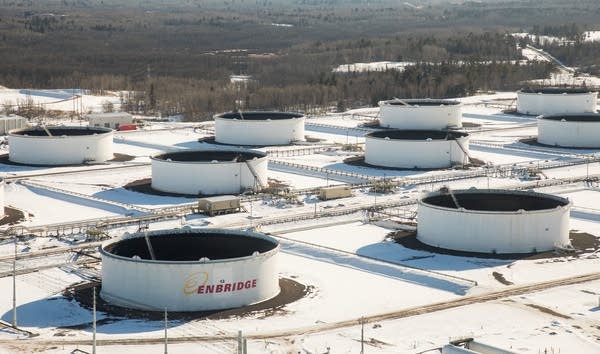MPCA issues draft permits for Enbridge’s Line 3 project

Go Deeper.
Create an account or log in to save stories.
Like this?
Thanks for liking this story! We have added it to a list of your favorite stories.
The Minnesota Pollution Control Agency issued three draft permits this week that are needed to build the Line 3 oil pipeline replacement project, marking another step in Enbridge Energy’s five-year effort to build the controversial pipeline across northern Minnesota.
The issuance of the draft permits follows the Minnesota Public Utilities Commission’s approval of the project earlier this month, in which the PUC first approved a revised environmental study of the project, and then reissued a certificate of need and route permit for the pipeline.
The PUC had originally approved the project in June 2018, but was forced to decide again whether to issue those approvals after the Minnesota Court of Appeals ordered the state to revise the project’s environmental impact statement.
On a separate track of permits and approvals, the MPCA on Tuesday released a draft of what’s referred to as a 401 water quality certification — which is required before the U.S. Army Corps of Engineers can issue a federal water quality permit for the project — along with a draft wastewater permit and air quality permit.
Turn Up Your Support
MPR News helps you turn down the noise and build shared understanding. Turn up your support for this public resource and keep trusted journalism accessible to all.
The agency will open a one-month public comment period on the draft permits on Monday, which will include a series of public meetings scheduled for the northern Minnesota communities of Mahnomen, Bemidji and Grand Rapids.
While the release of the draft permits and certification do not guarantee that the MPCA will eventually issue final permits, it does signify that the agency is confident that Enbridge can construct the pipeline while complying with water quality standards.
“What it really means is that we have reviewed their application iteratively over many, many months, and have determined, based on the conditions that we have put in these draft certifications and permits, that the activity, as limited by the certification or the permits, will protect water quality standards or air quality,” said Katrina Kessler, assistant commissioner of water and agriculture policy at the MPCA.
Enbridge has proposed replacing its existing Line 3 — which is cracking and corroding and has a history of spills — with a new pipeline along a new route across northern Minnesota.
The project would allow the Canadian company to nearly double the the amount of oil the pipeline currently carries, to 760,000 barrels per day. Enbridge has had to reduce the amount of oil it transports via the existing Line 3 to maintain safety.

The project has triggered passionate opposition, from climate change activists concerned about the additional greenhouse gas emissions caused by burning the additional oil the pipeline would carry; from residents worried about potential spills into lakes and rivers, including the headwaters of the Mississippi River; and from Native American activists and tribes concerned about the pipeline’s impacts on treaty-protected rights to hunt, fish and gather wild rice.
Advocates, including industry and labor groups, point to the thousands of construction jobs that would be created during construction, and millions of dollars in property tax revenue that would flow to counties through which the pipeline would pass.
The MPCA has a deadline of Aug. 15 to release a final 401 water quality certification. The proposed pipeline would cross 212 streams and rivers across northern Minnesota — including the Mississippi River, twice — and impact about 1,000 acres of wetlands.
The draft permit sets out conditions designed to ensure that construction of the pipeline does not degrade those waterways, including limits on materials and chemicals used during construction, imposing best management practices for crossing waterways, and restrictions to protect wild rice waters.
Agency officials declined to say whether they may issue the final certification earlier than Aug 15. They say that depends on the quality and the number of comments received during the public comment period.

Those comments can be submitted online or through the mail, or delivered in-person at public meetings at Sanford Center in Bemidji on March 17, Timberlake Lodge in Grand Rapids on March 18, or Shooting Star Casino in Mahnomen, Minn., on the White Earth Reservation on April 1.
The agency is purposefully holding those meetings outside of St. Paul, said Kessler, because the metro area “is not where the project is occurring and not where people are most immediately impacted, are living and working and recreating.”
In addition to the permits from the MPCA, Enbridge also needs to secure local permits and several approvals from the Minnesota Department of Natural Resources, including water appropriation and public waters work permits, utility crossing licenses and endangered species permits.

Enbridge also in all likelihood will face additional legal challenges. Opponents of the project, including tribes, environmental groups, and possibly the Minnesota Department of Commerce, can first request the Minnesota Public Utilities Commission to reconsider its decision to approve Line 3. Then they can challenge those approvals to the Minnesota Court of Appeals.
Meanwhile, many opposition groups continue to protest the project. On Wednesday, organizations including the Twin Cities Democratic Socialists of America and Northfield Against Line 3 rallied outside the offices of a Minneapolis law firm with links to Enbridge.
“Gov. Walz has framed his administration as a leader on climate action, but he has yet to take a firm stance on the Line 3 pipeline that according to official estimates would emit 193 million tons of CO2 per year, the equivalent impact of adding 50 new coal-fired power plants,” the groups said in a statement.
Enbridge called the release of the MPCA draft permits a significant milestone.
“After five years and thousands of hours of study, environmental review and regulatory process, it is time to move the Line 3 Replacement Project forward,” the company said in a statement.


